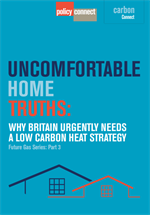Third instalment in IGEM-sponsored Future Gas Series presents some “Uncomfortable Home Truths” about low carbon heat
A new IGEM-sponsored report has called for an urgent Green Heat Roadmap by 2020 to scale low carbon heating technologies and help Britain’s homeowners access the help they need to take smarter, greener choices on heating their homes.

New report warns that continuing to heat 27 million homes with fossil fuels threatens the UK’s 2050 net zero carbon target and clean air goals
Poll: Most MPs do not see ‘green heat’ as policy priority for climate; consumers also ‘in the dark’ on the environmental impact of heating their homes and what to do about it
MPs say government must ‘step on the gas’ to scale ‘green heat’ innovation and help households control their heating bills, cut carbon and boost home comfort
IGEM response
A new IGEM-sponsored report has called for an urgent Green Heat Roadmap by 2020 to scale low carbon heating technologies and help Britain’s homeowners access the help they need to take smarter, greener choices on heating their homes.
The report, Uncomfortable Home Truths, follows the third inquiry in Carbon Connect’s Future Gas Series, supported by IGEM.
The report examines downstream issues relating to the role of the consumer in decarbonising gas in the UK, and says a bold new national roadmap is needed by 2020 to put consumers and households at the heart of a revolution in green heat innovation.
It recommends the creation of an Olympic-style delivery body to catalyse and coordinate regional innovation and local leadership, tailored to different parts of the UK and the nation’s diverse housing stock.
Ian McCluskey, IGEM’s Head of Technical Services and Policy, said:
“To meet our climate change ambitions of net zero carbon emissions by 2050, it is essential that we find and fund greener ways of heating our homes and buildings.
“While various options are possible, in engineering terms all have their challenges. Given the scale of the challenge, a significant effort is needed on all fronts. Success in transitioning to a low carbon future will require investment for training and skills ranging from technicians, design engineers, project managers, academia and industrial researchers.”
The report contains several key findings:
Continuing to heat Britain’s 27 million homes with fossil fuels threatens to undermine the UK’s 2050 net zero carbon legislation and clean air goals.
The transition to low carbon heat must put consumers first. Consumers are open to smarter greener heating solutions but are ‘in the dark’ about new technologies and lack access to independent advice they need to make better choices for their homes and the planet.
A national low carbon heat roadmap is needed by 2020. The next five years are critical in deciding the future of heat in the UK. Advances in green heat innovation around Britain are helping build momentum and should inform a comprehensive government policy strategy by 2025
A central Olympic-style delivery body is needed to coordinate the national transition to low carbon heat for homes, and to incentivise and scale regional and local leadership
Investment is needed to retrain and reskill the nation’s gas heating engineers and boiler installers in new low carbon technology solutions for a ‘just’ transition.
